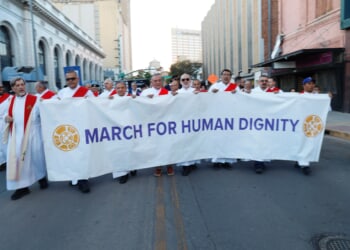Michael Reiners is a barrister, architectural historian, and writer.
Entering Britain, and never leaving, is at an all-time high. The Home Office grants refugee status, or failing that humanitarian protection under Article 3 of the European Convention of Human Rights (ECHR), all too liberally, with 67,978 applications granted in 2024.
One way to achieve this is to enter the country illegally, suggest that you have lost your passport, and claim to hail from a nation which will torture or execute you for a crime if returned (a favourite pick for this is Iraq).
You might also have tried the Ukraine Family Scheme, which, as ruled by Judge Norton-Taylor, did not require you to be a Ukrainian family. The magic-8-ball of the ECHR will always generate a reason for your permanent stay.
If you would prefer to enter by a more legitimate route, at time of writing, the ‘Skilled Worker’ visa salary threshold is set at less than the British average wage. Alternatively the Health and Care visa regime (expanded in 2021) admits unskilled care workers at an entry level, allowed unlimited dependants.
Better still, the Home Office does not proactively seek out those whose visas have expired, and, has no idea where 40 per cent of them are. According to the National Audit Office, they do not appear know how such visas even work.
If you chose the refugee route, rest assured that two-thirds of refugees go on to obtain settlement within seven years, with the vast majority (93 per cent) having obtained some form of indefinite leave to remain (ILR) after tten years. If you are going for the visa route then, provided you can stomach then years of unskilled care work without being dismissed, you will be granted ILR.
Between 742,000 and 1,224,000 migrants from the post 2020 wave will gain access to Indefinite Leave To Remain (ILR) very soon. That means access to benefits, social housing and the NHS – a package tantamount to citizenship and costing an estimated £234bn, equal to six years defence spending.
Essentially, the economic argument for immigration has collapsed: only five per cent of visas issued between 2022–2023 went to immigrants likely to be net tax contributors; the OBR estimates a low-skilled migrant will cost taxpayers £465,000 by age 81; and even high earners contribute only £1 in tax for every £1.60 taken by dependents.
Since 2019, 3.3 million foreign nationals have qualified for state benefits, with 50,000 gaining eligibility for Universal Credit each month.
ILR is costly, as Sam Bidwell highlighted, but the root cause (mass migration from the ‘Global South’) remains unaddressed. The 2021 Census shows high economic inactivity among Arabs (48 per cent), Bangladeshis (42.1 per cent), and Pakistanis (40.8 per cent) in Britain. White British people are now a minority in London (36.8 per cent), and 47.6 per cent of London social housing residents there were born abroad. The overall level has reached numbers close to one million per year.
Yet the media rarely addresses these realities, even routinely obscuring details relating to ethnicity in the reporting of crime, as here. Our inability to discuss the ethnic origin of entrants is not a conspiracy, however, but a function of identifiable laws leading to identifiable outcomes.
To understand our aversion to discussing mass migration in detail, one needs to understand that the Public Order Act 1986 (“POA”) threatens to make discussing ethnic origin in any way that is not wholly positive a criminal offence. This applies to individuals, our press, all public bodies, and all sizeable private bodies alike.
For your speech to become an offence under the POA, it is required merely that an imagined person might be “stirred” to hatred by your statement. Your intentions, and whether that statement has any impact or is even actually seen by another person, are all immaterial.
The POA invites police to take part in the imaginative exercise of creating criminals – something they are especially wont to do in the realm of digital communications.
One such case involved Lee Dunn, who posted three images of what were clearly supposed to be illegal Islamic migrants with variants of the caption “coming to a town near you”. Dunn was handed a 12-week custodial sentence, despite describing the government’s guidance (since 2021) on refugee resettlement, found here (pg. 8).
For those charged under the POA, their crime is essentially failing to express views in a middle-class way. When sentencing such guilty pleas, judges appear delighted to lay allegations of bigotry on thick, as though it were a criminal offence. Falling short of satisfying the criteria for criminality, your speech may still be recorded on your police record as a ‘non-crime hate incident’ – as Daily Telegraph journalist Allison Pearson discovered in 2024.
A cursory look at the bodies which regulate the press shows us why it painstakingly avoids frank discussions of reality.
Britain’s broadcasting regulator (Ofcom) introduced its Broadcasting Code in 2005, and strengthened it further in 2016. This code bakes the POA, and avoidance of liability under it, directly into broadcast media in Section Three. The (voluntary) Independent Press Standards Organisation (IPSO), created in 2014, takes the same approach in relation to print media, specifically in Clause 12. Both regulators threaten criminal liability and urge that, where possible, stories not mention ethnicity.
Similarly, over the passing 15 years of six-figure net migration our police have gradually stopped recording ethnicity for criminal offences – supposedly for fear of being called racist.
Just recently, the Metropolitan Police suspended PC Rick Prior, the elected Chairman of the Met Police Federation, for discussing the difficult job of policing newly-imported minority communities; as the FSU reported here, Prior raised this in the very federation established to handle such policing concerns.
The Home Office prefers the term “irregular migration” to describe illegal crossings of the channel, and MPs who request information from government departments on the ethnicity of universal credit recipients, early prison release and illegal-re-entry following deportation are either stonewalled or informed this data is not held.
(In the case of Rupert Lowe MP, they are relieved of the whip by their party and vexatiously reported to police.)
Institutions are obliged not to; their ignorance is compelled by law. To have any hope of even getting a clear and accurate picture of the problems caused by mass immigration, let alone dealing with them, such legislation must be repealed.




![Red Sox Fan Makes the ‘Catch of the Day’ with Unconventional ‘Glove’ [WATCH]](https://www.right2024.com/wp-content/uploads/2025/04/Red-Sox-Fan-Makes-the-‘Catch-of-the-Day-with-350x250.jpg)
![Jasmine Crockett Justifies Mass Illegal Immigration With Bizarre Argument [WATCH]](https://www.right2024.com/wp-content/uploads/2025/03/1742007023_Jasmine-Crockett-Justifies-Mass-Illegal-Immigration-With-Bizarre-Argument-WATCH-350x250.jpg)

![NYC Tourist Helicopter Falls into Hudson River, Siemens Executive and Family Among Those Killed [WATCH]](https://www.right2024.com/wp-content/uploads/2025/04/NYC-Tourist-Helicopter-Falls-into-Hudson-River-Siemens-Executive-and-350x250.jpg)








